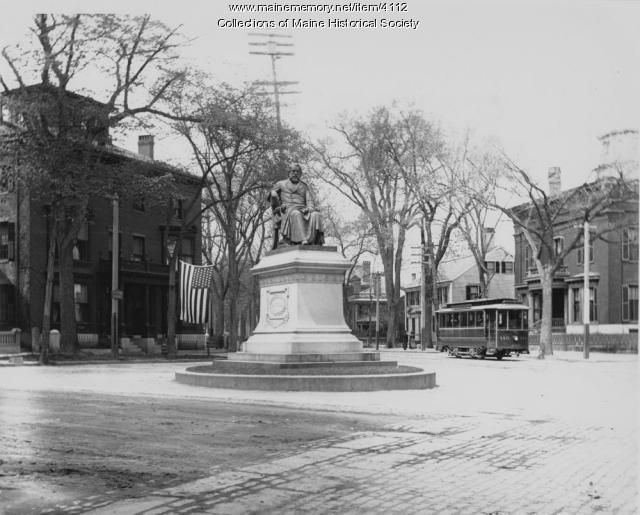Keywords: The Masters School
- Historical Items (21)
- Tax Records (0)
- Architecture & Landscape (0)
- Online Exhibits (29)
- Site Pages (32)
- My Maine Stories (12)
- Lesson Plans (2)
Lesson Plans
Your results include these lesson plans. Your results include these lesson plans.
Lesson Plan
Longfellow Studies: An American Studies Approach to Henry Wadsworth Longfellow
Grade Level: 6-8, 9-12
Content Area: English Language Arts, Social Studies
Henry Wadsworth Longfellow was truly a man of his time and of his nation; this native of Portland, Maine and graduate of Bowdoin College in Brunswick, Maine became an American icon. Lines from his poems intersperse our daily speech and the characters of his long narrative poems have become part of American myth. Longfellow's fame was international; scholars, politicians, heads-of-state and everyday people read and memorized his poems. Our goal is to show that just as Longfellow reacted to and participated in his times, so his poetry participated in shaping and defining American culture and literature.
The following unit plan introduces and demonstrates an American Studies approach to the life and work of Longfellow. Because the collaborative work that forms the basis for this unit was partially responsible for leading the two of us to complete the American & New England Studies Masters program at University of Southern Maine, we returned there for a working definition of "American Studies approach" as it applies to the grade level classroom. Joe Conforti, who was director at the time we both went through the program, offered some useful clarifying comments and explanation. He reminded us that such a focus provides a holistic approach to the life and work of an author. It sets a work of literature in a broad cultural and historical context as well as in the context of the poet's life. The aim of an American Studies approach is to "broaden the context of a work to illuminate the American past" (Conforti) for your students.
We have found this approach to have multiple benefits at the classroom and research level. It brings the poems and the poet alive for students and connects with other curricular work, especially social studies. When linked with a Maine history unit, it helps to place Portland and Maine in an historical and cultural context. It also provides an inviting atmosphere for the in-depth study of the mechanics of Longfellow's poetry.
What follows is a set of lesson plans that form a unit of study. The biographical "anchor" that we have used for this unit is an out-of-print biography An American Bard: The story of Henry Wadsworth Longfellow, by Ruth Langland Holberg, Thomas Y. Crowell & Company, c1963. Permission has been requested to make this work available as a downloadable file off this web page, but in the meantime, used copies are readily and cheaply available from various vendors. The poem we have chosen to demonstrate our approach is "Paul Revere's Ride." The worksheets were developed by Judy Donahue, the explanatory essays researched and written by the two of us, and our sources are cited below. We have also included a list of helpful links. When possible we have included helpful material in text format, or have supplied site links. Our complete unit includes other Longfellow poems with the same approach, but in the interest of time and space, they are not included. Please feel free to contact us with questions and comments.
Lesson Plan
Longfellow Studies: The Birth of An American Hero in "Paul Revere's Ride"
Grade Level: 9-12
Content Area: English Language Arts, Social Studies
The period of American history just prior to the Civil War required a mythology that would celebrate the strength of the individual, while fostering a sense of Nationalism. Longfellow saw Nationalism as a driving force, particularly important during this period and set out in his poem, "Paul Revere's Ride" to arm the people with the necessary ideology to face the oncoming hardships. "Paul Revere's Ride" was perfectly suited for such an age and is responsible for embedding in the American consciousness a sense of the cultural identity that was born during this defining period in American History.
It is Longfellow's interpretation and not the actual event that became what Dana Gioia terms "a timeless emblem of American courage and independence."
Gioia credits the poem's perseverance to the ease of the poem's presentation and subject matter. "Paul Revere's Ride" takes a complicated historical incident embedded in the politics of Revolutionary America and retells it with narrative clarity, emotional power, and masterful pacing,"(2).
Although there have been several movements to debunk "Paul Revere's Ride," due to its lack of historical accuracy, the poem has remained very much alive in our national consciousness. Warren Harding, president during the fashionable reign of debunk criticism, perhaps said it best when he remarked, "An iconoclastic American said there never was a ride by Paul Revere. Somebody made the ride, and stirred the minutemen in the colonies to fight the battle of Lexington, which was the beginning of independence in the new Republic of America. I love the story of Paul Revere, whether he rode or not" (Fischer 337). Thus, "despite every well-intentioned effort to correct it historically, Revere's story is for all practical purposes the one Longfellow created for him," (Calhoun 261). It was what Paul Revere's Ride came to symbolize that was important, not the actual details of the ride itself.


